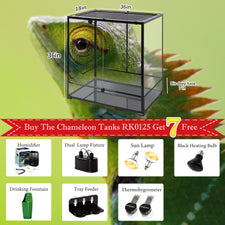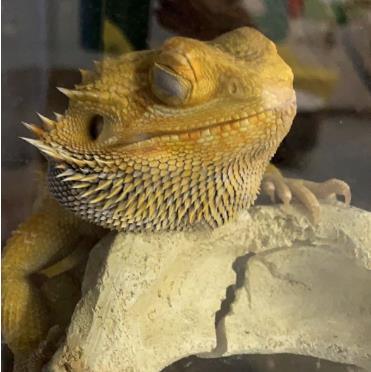Bearded dragons are unique reptiles, and their peculiar appearance makes them stand out among the reptile family. Also known as pogonas, bearded dragons live up to their name and have a tough, dragon-like appearance. Apart from the armor of shiny scales, these creatures also feature a beard of spikes under their chin. The gentle temperament and unique appearance of these reptiles make them a popular pick among pet lovers.
Even though bearded dragons are easy-going pets, as pet parents, it's our responsibility to know exactly how they need to be taken care of. In this post, we’ll be telling you everything you need to know about bearded dragons, how to tend to them, and ensure they are comfortable in your home - let’s have a look:
How Long Do Bearded Dragons Live?
Ordinarily, the lifespan of bearded dragons ranges from 10 to 15 years. When in their natural habitat, they live a long, healthy life. However, their lifespan reduces considerably when held in captivity. This is why, if you have a bearded dragon as a pet, it is essential that you replicate their natural habitat as much as you can.

Bearded dragons are gentle pets, but their environmental and nutritional needs are quite peculiar. As a pet parent, you need to be aware of the precise requirements of bearded dragons, so that they feel cozy and safe in your home. A special bearded dragon enclosure would be the perfect little home for your pet bearded dragon. It would also contribute to boosting their lifespan, even when they are held in captivity.
What do Bearded Dragons Eat?
Bearded dragons are omnivorous, which means they switch between herbivorous or carnivorous diets as required. These reptiles are not picky eaters and consume whatever food is available in their surroundings. When in their natural habitat, they consume a wide variety of insects such as beetles, and even rodents, and small lizards.
The jaws of bearded dragons are strong, hence, they can easily chew on hard-shelled and slightly bigger insects too. Apart from this, they also munch on flowers, fruits, and leaves depending on availability. When in the wild, they are very active, running across rocks, climbing trees, and digging burrows into the ground. Hence, they tend to eat a lot of food - basically anything and everything that comes to their sight.
We’ve talked about the food preferences of bearded dragons in their natural habitat. Now comes the main question -
What Can Bearded Dragons Eat?
When in captivity, bearded dragons are completely dependent on you for their food. As a pet parent, you need to be aware of the nutritional requirements of your pet and feed them a balanced diet in their bearded dragon tank. As bearded dragons are inherently omnivorous, you need to ensure you feed them a mix of plants and insects.
At home, your bearded dragon will be chilling in its bearded dragon enclosure, and will not have much activity. So, you need to feed them accordingly. Feeding them excessively will only make them obese, which again, isn’t a great sign. For your pet bearded dragon, you can keep the portion of insects lesser and feed it more greens and plants. You can discuss the right proportion with your vet and formulate a diet accordingly.
Insects
Bearded dragons LOVE live beetles, so make sure you include them in their insect diet. Apart from this. You can also feed them mealworms, butter worms, earthworms, phoenix worms, silkworms, wax worms, king worms, roaches, or crickets. Some worms are more nutrient-dense than others, so choose wisely. Also, you need to choose the size of the insects according to the age of your bearded dragons. Do not feed bigger-sized insects to baby bearded dragons. Here’s a little tip - you can safely feed your dragons the insects that are the size of the space between their eyes!
Any poisonous or potentially harmful insects are a big no for your dragons. Steer clear from elder bugs, dead insects, known venomous insects, fireflies, or basically any insect that glows.
Plants
Asparagus, bell peppers, carrots, cucumber, beans, hibiscus, peas, pumpkins, green and red cabbage, yellow squash, okra, radish, tomatoes, zucchini, and cooked sweet potatoes are safe veggies to feed your bearded dragon. Among the greens, you can feed it cilantro, celery, collard greens, kale, mustard greens, turnip greens, and broccoli.
Lettuce, mushrooms, avocado, beet greens, and random wild plants cannot be fed to bearded dragons and may prove to be harmful to them.
Fruits
Blueberries, apples, cherries, cantaloupe, guava, kiwi, pears, pineapples, watermelons, and strawberries are safe fruits for your bearded dragon. You can also add some flowers to their meals. Roses, hibiscus, and geraniums are perfectly safe.
What Size Tank is Perfect For Bearded Dragons?
The standard size tank for bearded dragons is 40 gallons. But some bearded dragons may grow bigger, and for them, it is best to get a bigger-sized bearded dragon enclosure, to prevent your pet from getting stressed.
20-gallon bearded dragon tanks are perfect for babies, which are typically less than 10 inches long. For the guidelines, you need to opt for the 40-gallon tank, whereas adults (over 16 inches long) require a bigger 50-75 gallon tank. If your bearded dragon grows beyond 20 inches, pick a 75 to the 125-gallon tank.
There are multiple options available when it comes to bearded dragon enclosures - you can pick ones made from glass or PVC plastic. The comfort of your pet is of utmost importance, so whatever you choose, keep this aspect in mind. Bearded dragon lighting in their enclosure is an important factor to consider as well. You cannot place the enclosure in direct sunlight, as it may kill your pet dragon. A tank with a good quality UVB lamp will provide the bearded dragon with all the heat and light they require to survive inside your home.
Summing Up
We’ve listed everything you need to know about bearded dragons, and how to care for them. Remember, their comfort and safety come before anything else - so food or enclosure, make the right choices. If you have any more questions about these beautiful reptiles, do let us know - we’d love to help you out!









